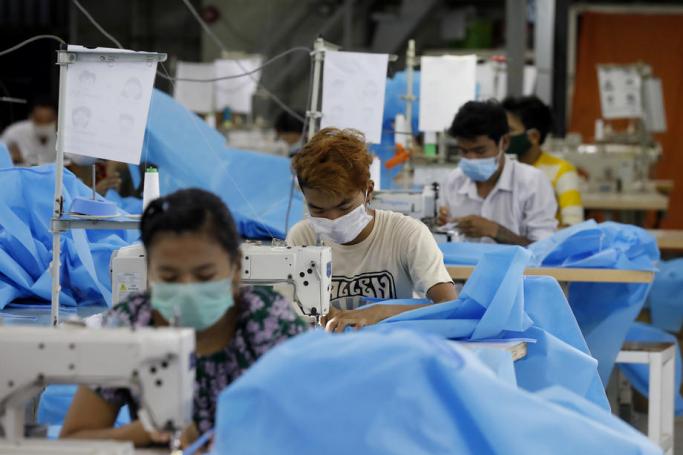In Myanmar, there are many jobless people and many of those who are employed now face daily violations of their labour rights.
Since the military coup in February 2021 violations of labour rights have risen.
Much of the labour force took part in protests against the military dictatorship. Some labour leaders were arrested by the junta and others had to run away. As a result, unions are unable to function properly.
This led to some employers turning a blind eye to labour rights. Some started to mistreat their employees by doing things such as not fully paying them, not paying them for overtime or dismissing them without compensation.
Workers are facing worse conditions than previously. Many of the labour abuses are happening in the Yangon industrial zones where there is the highest concentration of workers in the country.
According to the International Labour Organization (ILO), over 1.6 million people became jobless over the COVID-19 pandemic period and after the military coup in 2021. Of those about 350,000 worked in construction, 220,000 worked in the garment industry and more than 80,000 worked in tourism.
The sector that employs the most people in Myanmar is the garment sector. Previously it made a lot of foreign currency for the country. Prior to the pandemic about 700,00 people worked in the garment sector, of which 80 per cent were women. Now there are probably more like just under 500,000 workers employed in garment manufacturing.
Currently, the garment industry is the worst industry for labour rights violations. Taking advantage of the low demand for workers some employers have started abusing their workers. By law the minimum daily wage is 4,800 kyats ($2.59 USD) but, some factory owners are only paying their workers 3,600 kyats ($1.94 USD) a day, while making them work overtime without any additional payment. Reportedly, even factories that pay overtime have reduced overtime payments from 1,200 kyats (65 cents USD) an hour to 700 kyats (38 cents USD) an hour.
Labour law states that people who work on public holidays must be paid double their normal wages. Now they are only being paid their normal wages to work on public holidays. Other problems faced by workers are having to drink tap water due to not being given enough drinking water and only being allowed to go to the toilet at certain set times.
But not all factories are violating labour laws. International brands and factories owned by western investors, in the main, tend to follow local labour laws. If there are problems between employers and employees at such factories, they are normally settled by negotiations. Conversely, Chinese owned factories and workshops are reportedly the worst offenders when it comes to violating workers’ rights, according to labour rights activists.
Currently, workers face various hardships but, it is hard for them to do anything about it because there are no unions or union leaders to fight for their rights. If they complain to an employer or to anyone else that they are getting badly treated there is a real risk they will be dismissed. Despite this, when brave workers find the courage to report their employer’s bad practices to township labour offices they are just told to tolerate their current situation or negotiate with their employers.
These sorts of conditions led to Myanmar being one of the lowest scoring countries in the 2021 Global Labour Rights Index compiled by the International Trade Union Confederation, which represents 200 million workers from all over the world. The index was based on surveys conducted amongst workers in 149 countries. On a scale of one to five, with five being the worst conditions for workers, Myanmar scored five.
Reasons for Myanmar’s poor score include labour rights not being guaranteed by law, union members being killed or arrested, severe restrictions on freedom of expression and gatherings being denied or controlled.
On average there are about 150 labour strikes a year in Myanmar. Most of these are in response to employers violating workers’ rights by doing things like not properly paying wages, restricting labour rights and discriminating against union leaders.
Prior to the coup, investors were attracted to Myanmar by cheap wages, tax breaks, exemptions and the knowledge that the authorities will step in to handle any labour issues and protests. Despite this, some investors still follow labour regulations but many others do not.
Chinese investors reportedly have a bad reputation. Some invest directly while others contract Myanmar-owned companies to do work on their behalf. Though the majority of problems that occur between workers and employers happen in Chinese-owned or contracted factories little is known about them except that they are adept at exploiting Burmese workers.
Previously workers in Myanmar faced poor conditions and many labour violations. But since the coup they have faced even worse conditions under the junta administration. Labour departments know that workers' rights are being violated but they are just turning a blind eye and not taking the violations seriously.
This is why Myanmar will still be one of the worst scoring countries when the 2022 Global Rights Index is issued.












